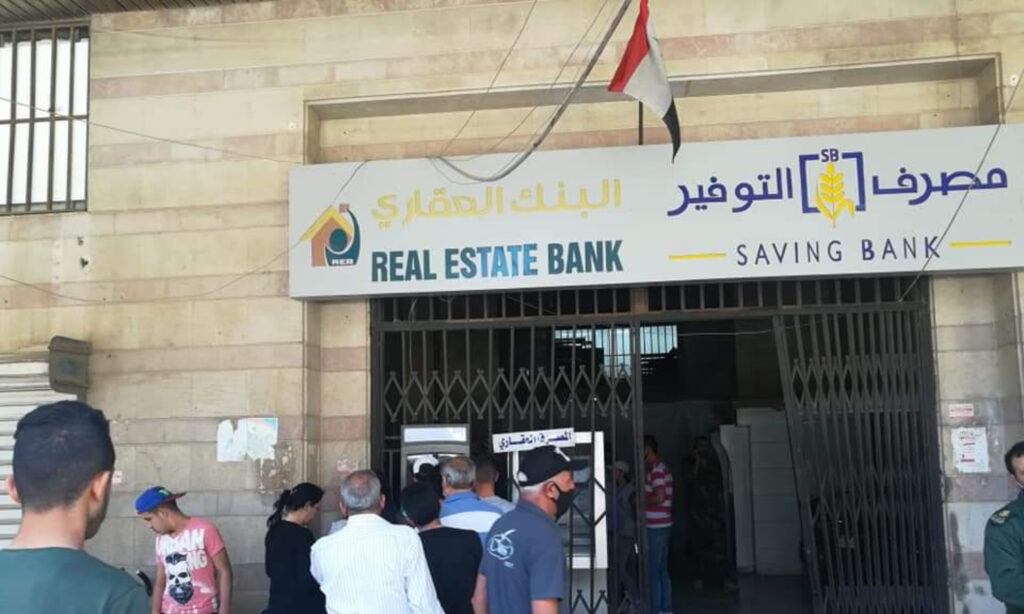Enab Baladi – Homs
About 80 people queue in front of the ATM of the Commercial Bank of al-Hamra Street in Homs city, waiting to withdraw their salaries even though they were deposited ten days ago, but the electronic banking services are still poor in the war-torn country.
The ATM works intermittently where only two to three people can withdraw cash before the “machine” turns off again for another hour or three.
Meanwhile, a police officer stands in front of the ATM to organize the lining up between women and men and make sure they stand in place.
The overcrowding in the new queue has been added to the queues of bakeries, petrol stations, and government departments as tens of people are standing in front of each ATM, waiting for their turn to receive their salaries or pay some fees, or perhaps they are waiting the end of a power outage where the ATM can operate again or being maintained if any problem occurred.
Ten meters away from the queue, three men stand. One of them told his fellows, “It is the middle of the month, and I have not been able to get my salary till now. I exist every day in front of the ATM. It seems that I was moved from my work in the Real Estate Records (Directorate) to live in front of the ATM in the streets.”
The government banks in Homs have only 5 ATMs that are out of service most of the time, either due to the power outage, the absence of the Internet, or because the ATMs are cashless or out of service.
Search for less crowded ATM
During the last decade, the banking sector in Syria witnessed a number of problems that hindered its services and led to a decline in quality.
Currently, the number of ATMs operating in the Syrian Commercial Bank and Real Estate Bank does not actually exceed 500, while the need is about 5,000.
The modest number of ATMs, where most are out of service all the time, prevents employees and retirees from getting their pensions at the beginning of each month.
With the hike of the ATM crisis in Homs, a large number of employees are forced to travel to another governorate in search of a less crowded ATM to withdraw their salaries.
The Homs-based Mukhlis Juma, 64, told Enab Baladi that at the beginning of each month, he had to travel to the town of Deir Atiyah, north of Damascus suburbs, to withdraw his salary, “fleeing the overcrowded queues in front of the out-of-service ATMs,” as he described.
“Residents of Homs and its countryside have only been allocated five ATMs, three of which are for the Commercial Bank and two for the Real Estate Bank. Private banks place the ATMs inside their branches and do not install them in the main streets due to the constant power outage and the weak internet network,” Juma said.
New type of brokerage
The automated teller machines are supposed to carry out many transactions, most notably providing bank account information, accepting deposits, withdrawing previously approved loans, as well as transferring funds.
But as the ATM crisis continues inside Homs, people do not receive any of these services, and some brokers have appeared to withdraw the employees’ salaries for 2000 Syrian pounds for each bank card.
Nadia al-Ahmad, 46, from the town of al-Rastan, told Enab Baladi that she has to pay 2000 pounds every month from the salary of her deceased husband in order to be able to obtain the salary.
She says that withdrawing the money from the ATMs on the first attempt is “almost impossible,” as most of them are out of service.
One of the brokers, based in Talbiseh town, told Enab Baladi on condition of anonymity, “I do not collect cards from anyone. They bring their cards to me so that I can collect their salaries,” adding that “the ATM service has almost stopped, and I only get 1000 pounds, and the other 1000 goes to the employee inside the bank branch.”
Cashless ATMs
One of the key problems that ATMs suffer from in Homs, in addition to small numbers, disruption, and suspension of service, is running out of money; the purpose which the ATM service was originally set for is not available.
An official in the banking sector told the local al-Watan newspaper that the banking institutions suffer from the lack of vehicles to transport money, as they are replaced by transferring money in unsafe ways, through public cars or the cars of some branch managers and even sometimes by motorcycles.
In view of the security situation, there are concerns over supplying the ATMs with cash and securing its transfer amid a shortage of workers responsible for operating the ATMs.
Syrian citizens do not benefit from e-government services, and they still rely on queues as an automatic means to regulate their access to services, including withdrawing money from ATMs.











